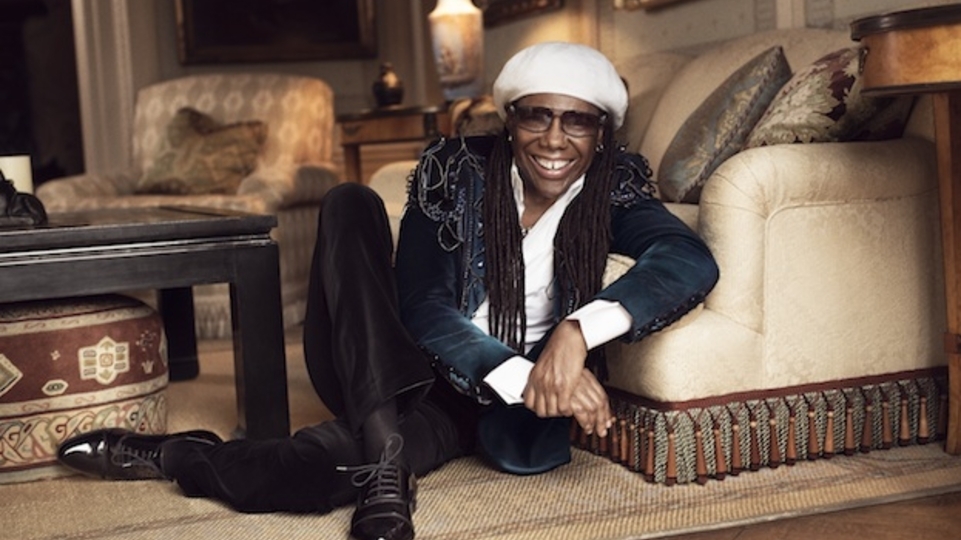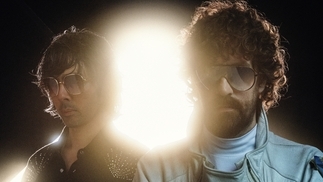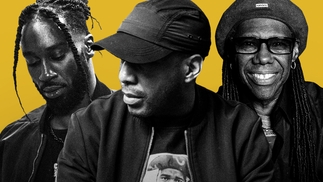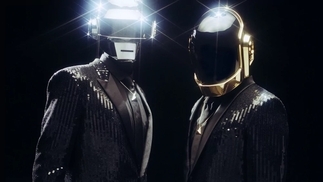IT'S ABOUT TIME
After decades connecting the dots of disco, the timeless Nile Rodgers unearths Chic music of the past to create a future where his sounds will forever fill the dancefloor...

“What’s up, baby?” Nile Rodgers answers the phone in arpeggio. For those who have never partaken in a conversation with the storied band Chic’s co-founder, he always sounds jazzed about something. It doesn’t matter if you’ve known him three decades or you’ve only just met three minutes ago, Nile radiates affection. It doesn’t matter if you’re a man or a woman; if you’re black, white or yellow, he also can get away with calling anyone “baby” without sounding cheeky. The guitar genius has put down his axe for long enough, yet he produces music to the ears still, by way of words. And much like his legendary tunes, it’s always good times to hear.
“I just played my new single for Warner [Music Group] and they didn’t know what to do with themselves!” Nile exclaims into the phone next. His words are sweeter than candy, only slightly less addictive than crack. At 62, the sage New Yorker seems to be growing younger. Not only do Chic — originally conceived of alongside fellow musician, bassist Bernard Edwards — remain one of the most prolific chart-topping bands of the disco era, Nile has also produced and written with many recording artists who’ve had smash hit dance records in the past 45 years. This is neither coincidence nor exaggeration. “I’m like the biggest collaborator in the world,” he’ll later state frankly, “that’s all I do.” Iconic names read alongside his like a musical rap sheet: David Bowie, Diana Ross, Madonna, Grace Jones, Duran Duran, Daft Punk, Pharrell Williams, Adam Lambert, Disclosure and Avicii are a mere few of the acts privy to Nile’s le freaky studio prowess.
Making some of the world’s most celebrated tunes is not the only thing Nile Rodgers does. He’s beaten cancer, written a book, started charities, scored movie soundtracks, picked up a few Grammys along the way. And now he’s got some new information. Be it sonically or telephonically, telling a story is his forte, and so he continues, exuding a smile somehow palpable via mobile airwaves. “This room of music execs flipped out when I played them the new single. They actually asked for an extended version! I had to explain to them that I only brought a demo because I’m used to label people not having any time. I told them I want to sell two million records,” he pauses for dramatic effect, or maybe the dramatic effect needs no pause, and — much like his aforementioned smile — is simply felt. “It’s a Chic record.” Nile saves the most interesting nugget for last, reasserting his time-honored showmanship. Always the performer displaying restraint, warming his audience for an impactful delivery on cue. “As in, an actual Chic record.”
Schedules are feverishly traded for a proper in-person chat, finally agreed upon for the day after Thanksgiving at his home in Westport, Connecticut, where a customized studio is conducive for recording around the clock. Today, the meticulous musician will squash hypotheticals and talk the art of making people dance, from conception to the nightclub. It was composed, recorded, lost and found. It was written, and now, it is finally told.
GOING BACK TO GO FORWARD
It must be understood that a new Chic offering cannot actually be new in the literal sense, but rather comprised of music the band recorded together in the past. They chose to stop playing years ago for a number of reasons, including the rise of the “Disco Sucks” era, a 1979 backlash against disco that sprouted among staunch rockers primarily in the United States. “New” Chic music is a relic, surviving for years without ever being heard or consumed by the masses. As Nile Rodgers explains, “Every Chic single was,” at least, “gold,” while “some were platinum, some were multiple-platinum”. However, “in the case of ‘Le Freak,’ the biggest selling single in the history of Atlantic Records”. The band then “stopped it after we passed the six million mark because we started to think, once we get close to seven or eight million, ‘is anyone ever going to buy our album?’ It was concluded not to find out the hard way. “We cut off the sales ourselves, and they [Atlantic Records] understood, even though they were pissed.”

CHIC at the Hammersmith Oden 1979 by Jill Furmanovsky
The core crew went on to record and pen hits for myriad music legends until in 1996 when Chic’s other founding member, bass hero Bernard Edwards, abruptly passed away from what has been cited as pneumonia. Nile’s devastation over the loss of his sonic blood brother remains perceptible today. “All the guys in my band passed away,” he shrugs. “Bernard has been dead since April of ’96. Luther Vandross died shortly after that. Tony Thompson died shortly after that, and then Raymond Jones died on the exact same day as Luther Vandross, I think six years apart.” While the very-much alive Nile Rodgers forges onward — he’s practically a member of Duran Duran — that doesn’t mean his path has been an easy one. “It was really weird for me,” Nile explains pensively. “I’m producing Duran Duran, hanging out with them and I get to see them be together. It’s hard because they’re so close to me. And even though they’re like my band in a way, they’re not Chic.”
Like a sharp interlude to a soft aria, gnawing questions return as Nile Rodgers laments his fallen friends whilst overlooking a picturesque body of water from his kitchen table in Westport. Floor-to-ceiling windows boast views of neighboring boats tied to a dock, rocking to the beat of new thoughts now ringing about the brain mellifluously like a cowbell. The last time DJ Mag caught up with Nile Rodgers, it was in Ibiza during last summer’s International Music Summit when he was being honored with a Legends Award. Duran Duran’s Simon Le Bon surprised him by appearing at the Legends Awards Dinner and the two jumped onstage together with P-Funk’s George Clinton for a live rendition of ‘We Want The Funk’. What might happen this month when the Recording Academy Producers & Engineers Wing celebrates its eighth annual Grammy Week event honoring Nile for his commitment to excellence and ongoing support for the art and craft of recorded music? One can only fantasize.
There have been tales of lost Chic tapes, but until now, an official Chic Organization piece of music has been nothing more than a thing of Nile Rodgers’ dreams and promises. Why has he chosen this moment to finally make them a reality? “Because I got the tapes back.” His reply seems too obvious and, subsequently, is just a warm-up answer. “I got those tapes. Well, a few months later I was diagnosed with cancer. At that point in time I was not thinking about making a record. I remember the doctor telling me that the decisions that I made had to solely be my own. The most important thing I could do is not listen to anyone else, because you have to live or die by this decision. That was the best advice I ever got.”
Nile chose to fill his second chance at life with the creation of music. “When I got the music back, I realized that there were a lot of songs that were unfinished, almost no outtakes, every [Chic] album that exists is a complete album. Two reels of tape and you’re done, that’s it, that’s the album. And they’re all like that.” From Bernard and Nile tag-teaming on timeless works — ‘We Are Family’ for Sister Sledge in 1978 to Diana Ross’ ‘Diana’ (yielding treasured hits ‘Upside Down’ and ‘I’m Coming Out’) in 1980, to Madonna’s 1984 magnum opus ‘Like A Virgin’, which also saw contributions from original Chic players, Robert Sabino on the keys and drummer Tony Thompson, Nile attests, “we made every record the same way for a long time. To find things that exist but never saw the light of day for me is really emotional and amazing”. Momentarily tossing sentiment aside, Nile throws down some harsh truth. “It’s also about fucking time I did another Chic record.” This is when his new album title is revealed rather aptly as ‘It’s About Time’.

I’LL BE THERE
“Here’s the way I’m doing it,” Nile starts outlining his process for releasing music. “This needs to feel the way it’s always felt and I don’t really care if people disagree. Albums for me are like films or books or articles; it’s a story, a snapshot of my life at a certain moment in time. The album tells that story; however, you need to read that prologue first. The same applies to marketing films. I see the trailer and [then] I’ll decide if I wanna go sit there and immerse myself in the film. In the music business era I grew up in, that first single is the trailer, the thing that lets people know this body of work is coming out soon and it is pretty dope. That’s what singles were.”
The trailer for ‘It’s About Time’ echoes this resolute blueprint with lead single, ‘I’ll Be There’, which turns out to be, indeed, pretty dope. Summoning sweet nostalgia for a musical era lost as well as supremely danceable beats, ‘I’ll Be There’ features kicks, snares and other percussive elements courtesy of New York City duo The Martinez Brothers. Hearing ‘I’ll Be There’ is like experiencing déjà vu; although you’ve never encountered the tune, it’s as familiar as an old friend. Crisp electro synth meets the undeniable plucking skills of Nile Rodgers in an orgasmic crescendo, topped off with catchy lyrics that hit the sonic G-spot. The naysayers will come with throwaway critiques of bastardizing pure disco and other aurally snobbish comments may swirl, but the truth is anyone who can’t enjoy this song — quite similarly to his 2013 smash collaboration with Daft Punk and Pharrell Williams, ‘Get Lucky’ — may require a therapist and a prescription for Prozac. Listen once and you’ll like it, twice and you’ll know the whole thing by heart, and find yourself singing it in the shower for a week.
“The true meaning is underneath, and then we lay a message that’s easily digestible to the public on top.” Nile Rodgers breaks down the single’s narrative, deciphering what he refers to as the DHM, or Deep Hidden Meaning. Let it be known that, “I’m not trying to sound like we’re all heavy and shit. Every Chic song has at least two meanings. This is what all of our songs are about. The reason why it’s important to understand the DHM of the song is because that’s how we [the band members] interpret it. That’s how we play it.” Grabbing a pile of sheet music, the lyrics scribbled out in pencil read as follows:
“Life began for me when a single DJ dropped a needle on our vinyl/I looked out to see people on the dancefloor a living proof of our arrival/Every night was a blast... we did it fast... now I don’t want to live in the past/But it’s a nice place to visit and if you come along/I’ll be there.
“So basically what this is, and it’s almost even hard for me to say it,” admits Nile, papers in hand like a passionate professor, “it almost makes me want to cry, I’m talking to Bernard and Tony and Luther, and basically when I die we’ll all be there together. So that’s actually what I’m really saying. The double message is that if you are down to this disco music that we’re playing, we’re here for you. Chic is here, and this is Chic, this is us.”
Like a New York City disco-themed fairy tale opening in a club called Night Owl, the first time Nile Rodgers heard his own song, ‘Everybody Dance’, a DJ named Robert Drake, sending the crowd into blissed-out bedlam, spun it on acetate. This was the moment the then-budding guitarist found his definitive calling in music. “People screamed and they jumped up and started imitating Bernard’s bass,” he regales. “And they’re dancing around, screaming ‘Everybody dance, clap your hands’. He played it for an hour. That shit was amazing to me, I was like, ‘I must be on another planet’.” The first single is “the story, it’s my story and I don’t take this kind of shit lightly. It’s literally the story of the beginning of my life in the music business as Chic, and it’s as if life began for me when a single DJ dropped the needle on our vinyl”. As for the rest of the album, Nile remains tight-lipped, focusing only on the trailer, because like every facet of the ‘It’s About Time’ project, it’s the way Chic would have done it. “The single goes at the beginning of the summer, the album comes at the end of summer. It’s always been our concept.”
VERNAL EQUINOX
In the past three years Nile Rodgers has laid down studio tracks with Disclosure, Chase & Status, Avicii, Tensnake and much of electronic dance music’s coterie. It was one session in particular with Bronx-bred brothers Steve and Christian Martinez that resulted in their winning spot on the record. “I needed percussion players and they were guys that do in today’s world what we did in the world that I came from, so they were the right guys,” Nile juxtaposes the young Martinez Brothers with his studio mates of yore. Owners of the Cuttin’ Headz imprint and house affiliates of revered Ibiza-born party brand Circo Loco, The Martinez Brothers are the only non-Chic cohorts who made it onto the record. “The reason why the Martinez Brothers are very relevant is because every Chic record has percussion. So on the original song that we cut that I used for ‘I’ll Be There,’ the percussion wasn’t as hyped as it should have been, because percussion was part of Chic’s over-dubbing process — what we used to call back in the day, sweetening. So the percussion is sweetening, strings are sweetening, horns are sweetening, background singing is sweetening, the basic record played by the rhythm section, just the five guys: the guitar, bass, drums, keyboard, piano, two pianos, acoustic piano or synth — that’s the basic section. That’s what The Martinez Brothers had. So they did the sweetening, the percussive sweetening, which is what we would have done back in the day.”
The release party is set for 20th March 2015, the date chosen not at random by some studio hack in a suit but because that day will be a vernal equinox. “When the day and night are of equal length,” says the methodical artist. “This year in 2015 will be a total solar eclipse as well, and it’ll be the first time that there’s been a total solar eclipse on the vernal equinox in a long time.”
As for Nile Rodgers, his glow blazes; and the world is drawn to it like moths to the flame. “It’s like when we used to go to the studio and record and you’ll even hear on the record, I leave it in, where the song ends and Bernard says, ‘We almost got it, let’s do it again’, and that’s an outtake.” This outtake is the beginning of the next phase of Nile’s life’s work. He invites you along to dance to “this disco” music that is Chic.
words: SARAH POLONSKY pics: RICHARD AGUDELO stylist: KIMMIE SMITH





